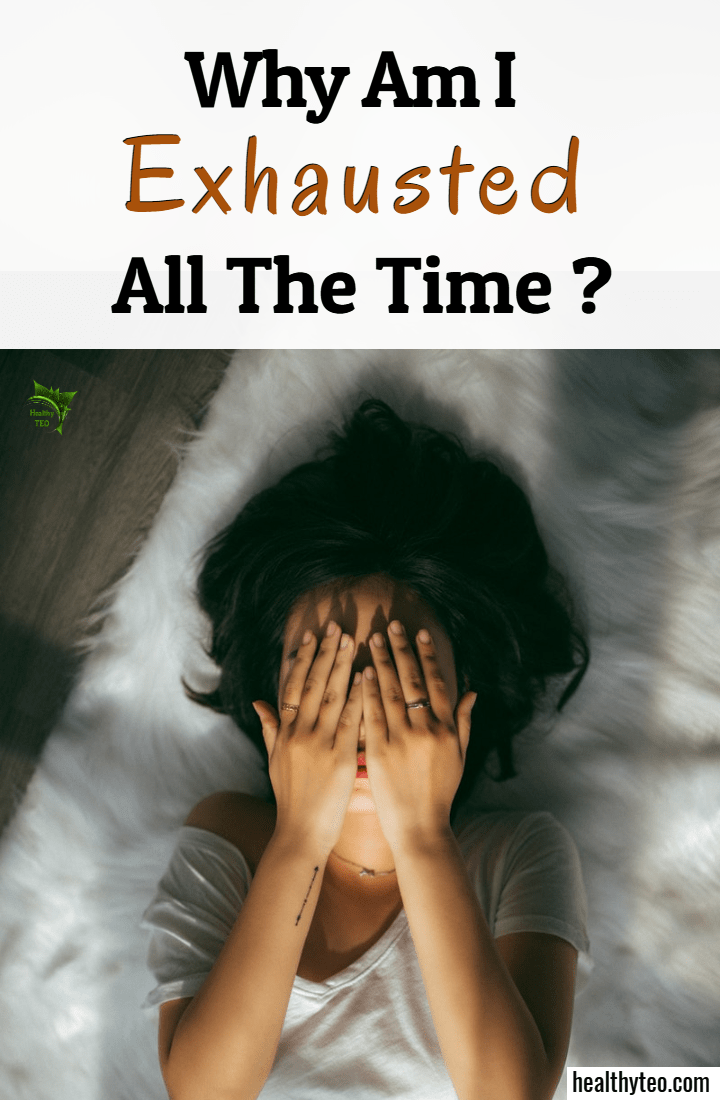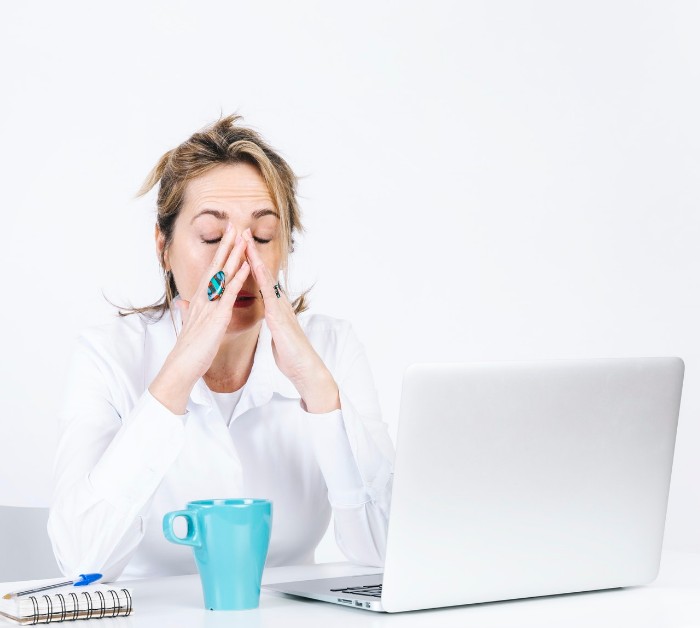Reasons for exhaustion and low energy levels
Why am I exhausted all the time? This is the question that you ask yourself after having a good night’s sleep, eaten a portion of healthy food, and going to the gym every day.
Still, you have low energy levels. Causes for feeling tired and exhausted are many.
We will introduce to you the most common ones and how to change some things to bring back the energy in your life.
Why Am I Exhausted All The Time?
Feeling exhausted is so common that it has its acronym, TATT, which stands for “tired all the time“.
Dr. Rupal Shah, a GP in south London, says tiredness is one of the most common complaints she sees in her surgery.
“I see loads and loads of patients who complain of feeling exhausted, even though they’re sleeping well. Often it’s been going on for several months.”
At any given time, one in five people feels unusually tired, and one in 10 have prolonged fatigue, according to the Royal College of Psychiatrists. Women tend to feel tired more often than men.
“It’s unusual to find anything physically wrong. Most of the time, fatigue is linked with mood and the accumulation of lots of little stresses in life,” says Dr. Shah.
Dr. Shah says she routinely takes a blood test from patients complaining of tiredness to rule out a medical cause, such as anemia or an underactive thyroid gland.
“There’s more chance of a medical reason for tiredness if there are other symptoms as well, such as heavy periods, weight loss, a change in bowel habits, hair loss, extreme thirst, and so on.”
If you want to work out how you became tired in the first place, it can help to think about:
- parts of your life, such as work and family, that might be particularly tiring
- any events that may have triggered your tiredness, such as a bereavement or relationship break-up
- how your lifestyle may be making you tired
Physical causes of tiredness
There are lots of health complaints that can make you feel tired. Not just the well-recognized ones like anemia and thyroid problems, but also more surprising ailments, such as diabetes, food intolerance, and a sleeping disorder called sleep apnoea.
Being overweight or underweight can cause tiredness. That’s because your body has to work harder than normal to do everyday activities. If you’re underweight, you have less muscle strength, and you may feel tired more quickly.
Pregnancy, especially in the first 12 weeks, can also sap your energy.
Psychological causes of tiredness
Psychological tiredness is far more common than tiredness that’s caused by a physical problem.
One key reason is anxiety, which can cause insomnia and, in turn, lead to persistent fatigue.
A survey by the Mental Health Foundation found that nearly a third of the population are severely sleep-deprived, often because of job and money worries.
The Foundation’s report, Sleep Matters, suggests a link between insomnia and low energy levels.
The worries and strains of daily life can be exhausting – even positive events, such as moving house or getting married. Emotional shock, such as bad news, bereavement, or the break-up of a relationship, can make you feel drained.
Mental health problems such as depression or anxiety can make you feel more tired. They can also prevent you from getting a proper night’s sleep.
If you think your tiredness may be rooted in a low mood, try this short audio guide to dealing with your sleep problems.
Lifestyle causes of tiredness
Tiredness can often be attributed to lifestyle factors, such as drinking too much alcohol or having a bad diet.
If you drink alcohol in the evening, it tends to wake you in the middle of the night. If you drink a lot regularly, it can make you depressed and affect your sleep.
“I’m always surprised to find how often patients who complain of tiredness are drinking far too much,” says Dr. Shah.
If you have a disturbed sleep pattern – for instance, if you work night shifts, sleep in the day, or look after young children – it can be difficult to get a good night’s sleep, and you’ll feel tired during the day.

Here are 12 possible reasons why you may feel exhausted all the time.
1. Diet
If you tend to skip meals, you may not be getting the calories you need to keep your energy up. Long gaps in between meals can cause your blood sugar to drop, decreasing your energy.
It’s important not to skip meals. You should also eat healthy energy-boosting snacks between meals, especially when you start to feel sluggish. Healthy snack options include bananas, peanut butter, whole-grain crackers, protein bars, dried fruit, and nuts.
2. Vitamin deficiency
Being exhausted all the time can also be a sign of vitamin deficiency. This could include low levels of vitamin D, vitamin B-12, iron, magnesium, or potassium. A routine blood test can help identify a deficiency.
Your doctor may recommend taking supplements. You can also increase your intake of certain foods to correct a deficiency naturally. For example, eating clams, beef, and liver may reverse a B-12 deficiency.
3. Lack of sleep
Late nights can take a toll on your energy level. Most adults need between seven and nine hours of sleep each night. If you get into a habit of staying up late, you’re putting yourself at risk for sleep deprivation.
Practice better sleep habits to boost your energy. Go to bed earlier and take steps to improve the quality of your sleep. Sleep in a dark, quiet, and comfortable room. Avoid stimulating activities before bed, like exercise and watching TV.
If your sleep doesn’t improve with self-care, talk to your doctor. You may need a prescription sleep aid or a sleep study.
4. Being overweight
Being overweight can also cause exhaustion. The more weight you carry, the harder your body must work to complete everyday tasks like climbing stairs or cleaning.
Come up with a plan to lose weight and improve your energy level. Start with light activity such as walking or swimming, and gradually increase intensity as your stamina allows.
Also, eat more fresh fruits, vegetables, and whole grains. Curb your intake of sugar, junk foods, and fatty foods.
5. Sedentary lifestyle
Physical activity can also boost your energy level. A sedentary lifestyle, on the other hand, can leave you feeling exhausted and sleepy.
In one study, researchers investigated how an inactive and sedentary lifestyle influenced feelings of fatigue in women.
Seventy-three women were included in the study. Some of the women’s lifestyles met physical activity recommendations, while others weren’t physically active.
According to the findings, the less sedentary women had a significantly lower level of fatigue. This supports the notion that increased physical activity contributes to more energy and vigor.
6. Stress
Chronic stress can cause headaches, muscle tension, stomach problems, and fatigue.
When under stress, your body goes into fight-or-flight mode. This causes an increase in cortisol and adrenaline, which prepares your body to deal with such situations.
In small doses, this response is safe. In the case of chronic or ongoing stress, it takes a toll on your body’s resources, leaving you feeling exhausted.
Learning how to control stress may improve your energy level.
Start by setting limitations, creating realistic goals, and practicing changes to your thought patterns. Deep breathing and meditation can also help you stay calm in stressful situations.
7. Depression
When you feel depressed, lack of energy and tiredness can follow. If you’re experiencing depression, talk to your doctor and discuss treatment options.
Your doctor may prescribe an antidepressant or an anti-anxiety medication. You might also benefit from mental health counseling.
Cognitive-behavioral therapy is a type of treatment that helps correct negative thought patterns that lead to a negative mood and depression.
Read More: Mental Health Tips: How To Improve Your Mental Health
8. Sleep disorders
The asleep disorder is sometimes the underlying cause of tiredness.
If your energy level doesn’t improve after a few weeks, or after you make the right lifestyle modifications, speak with your doctor. You may need to see a sleep specialist.
Asleep disorders like sleep apnea can be causing your tiredness. Sleep apnea is when your breathing pauses while you’re asleep. As a result, your brain and body don’t receive enough oxygen at night. This can lead to daytime fatigue.
Sleep apnea is a serious condition. It can cause high blood pressure, poor concentration, and lead to a stroke or heart attack.
Treatment involves using a CPAP machine or an oral device to keep the upper airway open while you’re asleep.
9. Chronic fatigue syndrome
You may feel tired all the time if you have chronic fatigue syndrome. This condition causes extreme fatigue that doesn’t improve with sleep. Its cause is unknown.
There’s no test to confirm chronic fatigue. Your doctor must rule out other health problems before making a diagnosis. Treatment involves learning how to live within your physical limitations or pacing yourself. Moderate exercise may also help you feel better and increase your energy.
10. Fibromyalgia
Fibromyalgia causes widespread muscle pain and tenderness. This condition affects the muscles and soft tissue, but it can also cause fatigue.
Because of the pain, some people with the condition are unable to sleep at night. This can lead to daytime sleepiness and fatigue.
Taking an over-the-counter pain reliever can help improve pain and sleep. Also, some people have had positive results with an antidepressant, as well as physical therapy and exercise.
11. Medication
Sometimes, medication can cause you to feel exhausted all the time. Think back to when you first noticed daytime sleepiness. Was this around the time when you started a new medication?
Check drug labels to see if fatigue is a common side effect. If so, talk to your doctor. They might be able to prescribe another drug or reduce your dosage.
12. Diabetes
Feeling exhausted all the time can also be a symptom of diabetes. When you have diabetes, your body doesn’t make enough insulin.
This can cause high blood sugar, which can affect your concentration and leave you feeling fatigued and irritable.
See a doctor for any unexplained fatigue that doesn’t improve. Keep in mind that fatigue can also be a symptom of other medical conditions like heart disease and cancer.

Final thoughts on why you are exhausted all the time
Every day is not the same. Reasons for feeling exhausted can be bad sleep, bad diet, or some lifestyle factors.
If you feel exhausted every day even when you sleep well and take care of your physical and mental health it is good to make some tests and consult with your doctor.
Related with feeling tired and have low energy levels
Sources: healthline.com your.md




